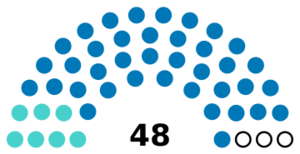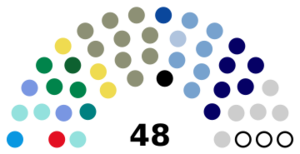Expediency Discernment Council facts for kids
Quick facts for kids Expediency Discernment Councilمجمع تشخیص مصلحت نظام |
|
|---|---|
| Type | |
| Type |
Advisory council
|
| Leadership | |
|
Chairperson
|
Sadeq Larijani
Since 30 December 2018 |
|
Secretary
|
Mohammad Bagher Zolghadr
Since 19 September 2021 |
|
Spokesperson
|
Mohsen Dehnavi
Since 9 January 2025 |
| Structure | |
| Seats | 35+13 |
|
Political groups
|
By faction
Principlists (38)
Reformists (7) Vacant (3) By party
SST (9)
IRGC (6) Independent principlists (6) Independent reformists (3) ICP (3) ISE (3) CCA (2) FIRS (1) SPIR (1) SDIR (1) PJPII (1) RFII (1) ACC (1) OIF (1) ECP (1) Independents (5) Vacant (3) |
The Expediency Discernment Council of the System (Persian: مجمع تشخیص مصلحت نظام Majma'-e Tašxis-e Maslahat-e Nezâm) is an important group in Iran. It's like a special advisory committee that helps the country's top leader, called the Supreme Leader. This council was created in 1988 to help solve problems and disagreements in the government.
Contents
What is the Expediency Council?
The Expediency Discernment Council (EDC) is a powerful group in Iran. Its main job is to advise the Supreme Leader on important decisions. It also helps solve disagreements between two other key parts of the government: the Majlis (which is like Iran's parliament) and the Guardian Council.
Why was the Council Created?
Back in 1987, Iran's law-making process faced a big problem. The Islamic Consultative Assembly (Majlis) and the Guardian Council often disagreed on new laws. These disagreements stopped important decisions from being made. To fix this, Ayatollah Khomeini, who was the Supreme Leader at the time, ordered the creation of the EDC in February 1988.
How the Council Works
The EDC's main role is to find solutions when the Majlis and the Guardian Council can't agree on a law. If the Guardian Council thinks a law passed by the Majlis goes against religious rules or the constitution, and the Majlis still wants the law, the EDC steps in. It decides what is best for the "expediency" (or benefit) of the Islamic Republic of Iran.
The council also advises the Supreme Leader on big decisions about the country's domestic (inside Iran) and foreign (outside Iran) policies. It can even oversee other parts of the government.
Who are the Members?
Members of the Expediency Discernment Council are chosen by the Supreme Leader every five years. When it first started, the council had 13 members. Over time, its size grew. For example, in 1997, it expanded to 34 members.
Many members of the council are religious scholars, like ayatollahs and hojatoleslams. Important government officials, like the President and the head of the Judiciary, are also part of the council.
Council's Role in Leadership
The EDC also has a special role if the position of Supreme Leader ever becomes vacant. In such a case, a temporary council made up of the President, the head of the Judiciary, and a religious expert from the Guardian Council would take over the Supreme Leader's duties. The EDC helps choose who fills these roles if someone can't do their job.
Current Members (2022–Present)
The members of the Expediency Discernment Council are divided into two main types: "Natural personalities" and "Ex officio members."
- Natural personalities are individuals appointed directly by the Supreme Leader.
- Ex officio members are people who are part of the council because of another important job they hold in the government.
|
Conservative Reformist |
|
|
||||||||||||||||||||||||||||||||||||||||||||||||||||||||||||||||||||||||||||||||||||||||||||||||||||||||||||||||||||||||||||||||||||||||||||||||||||||||||||||||||||||||||||||||||
Chairpersons of the Council
The Chairperson is the leader of the Expediency Discernment Council. This person is very important because they guide the council's discussions and decisions.
Colour key:
- Combatant Clergy Association
- Society of Seminary Teachers of Qom
| № | Chairperson | Tenure | Supreme Leader | ||
|---|---|---|---|---|---|
| Name | Picture | Took office | Left Office | ||
| 1 | Ali Khamenei |  |
7 February 1988 | 4 June 1989 | Ruhollah Khomeini |
| 2 | Akbar Hashemi Rafsanjani |  |
4 October 1989 | 8 January 2017 (died in office) |
Ali Khamenei |
| — | Ali Movahedi-Kermani (Acting) |  |
1 February 2017 | 14 August 2017 | |
| 3 | Mahmoud Hashemi Shahroudi |  |
14 August 2017 | 24 December 2018 (died in office) |
|
| — | Ali Movahedi-Kermani (Acting) |  |
29 December 2018 | 30 December 2018 | |
| 4 | Sadeq Larijani |  |
30 December 2018 | Incumbent | |
See also
 In Spanish: Asamblea de Discernimiento de Conveniencia del Sistema para niños
In Spanish: Asamblea de Discernimiento de Conveniencia del Sistema para niños
- Center for Strategic Research
 | Selma Burke |
 | Pauline Powell Burns |
 | Frederick J. Brown |
 | Robert Blackburn |



